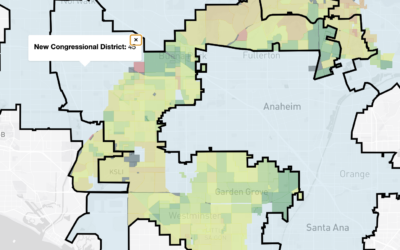
For Immediate Release
Link to English PDF | Vietnamese PDF
Tuesday, February 22nd, 2022
Contacts:
VietRISE: Vincent Tran, (714) 775-6789 | vincent@vietrise.org
Othering & Belonging Institute: Marc Abizeid (925) 434-4106 | marcabizeid@berkeley.edu
Study: Vietnamese residents more likely than any other group in Orange County, CA to support redistributive policies
Across Multiple Questions, Vietnamese Voters Say Government Should Be More Active in Addressing Economic Inequality, Racism
Little Saigon, Orange County, CA – A larger share of Vietnamese residents than any other ethno-racial group in Orange County says that they believe it is government’s responsibility to reduce income inequality. Vietnamese survey respondents were also the least likely to say that government should provide fewer services in order to reduce spending. These findings cut against conventional wisdoms and assumptions about what motivates Vietnamese constituencies, and are among the results of a new study published by the Othering and Belonging Institute at UC Berkeley (OBI) and VietRISE, a community-based organization in Little Saigon, Orange County, CA.
The study consists of a countywide survey (n= 1,516) conducted in English, Spanish, and Vietnamese that included nearly 200 Vietnamese residents, and a series of focus groups held with Vietnamese-language speakers. The design and implementation of the focus groups was carried out collaboratively by OBI researchers and VietRISE. The research supports knowledge-building to strengthen VietRISE’s, and other 1.5- and 2nd-generation Vietnamese American-led, programs to build intergenerational and cross-cultural civic engagement in Orange County.
Linda Trinh Vo, Professor of Asian American Studies at University of California, Irvine, reviewed the study and said: “Using both focus groups and survey data, this rigorous study counters simplistic narratives of Orange County’s Vietnamese Americans, especially the first generation, and reveals their complex viewpoints on vital economic, political, and social issues. Their voices need to be heard by policy makers, politicians, and younger generations who have the capacity to brighten the future of the Little Saigon community.”
Results from the survey challenged the long-held assumption – pervasive among political consultants – that Vietnamese Americans reject redistributive economic policies, due to negatively associating those policies with communism. To the contrary, 63 percent of Vietnamese respondents said they agree that, “It is the responsibility of government to reduce the differences in income between people with high incomes and those with low incomes,” with 43 percent saying they “strongly agree.” For comparison, 61 percent of Latinos agreed (31 percent strongly), 57 percent of other (non-Vietnamese) Asian Americans and Pacific Islanders (28 percent strongly), and 32 percent of white residents (13 percent strongly).
Further, 85 percent of Vietnamese respondents support a government-guaranteed basic income policy (68 percent strongly), and 66 percent believe that government should “provide more services, even if it means an increase in spending.”
Focus groups allowed the research team to home in on a subgroup of Vietnamese community members who are underrepresented in public dialogue, and whose voices and concerns VietRISE is committed to elevating in its work. That subgroup is Vietnamese-language dominant community members who are a generation older and politically independent. Though the Vietnamese community is often depicted as politically polarized, independents account for more than a third of registered Vietnamese voters in Orange County. “With this in mind,” said OBI’s Political Participation Analyst, Joshua Clark, one of the authors of the report, “although the most partisan voices are often heard loudest, this independent group represents the community’s true ‘center of gravity’.”
What these independents said about government reinforces the survey’s findings on Vietnamese Americans’ support for redistributive policies. Overwhelmingly, focus group participants expressed that the principal job of elected officials is to improve constituents’ lives, above all in material terms. When asked about “government,” most focus group participants first thought of officials at the local level. They said that these leaders should exemplify care, compassion, and service, especially for those who are struggling or cannot meet basic needs.
“A lot of assumptions about what Vietnamese Americans believe government should be are made by political consultants and political interests. Those assumptions often turn into public policy that doesn’t reflect the beliefs and needs of the community,” said Tracy La, Executive Director of VietRISE. She continued: “While many local elected officials who represent large Vietnamese communities have failed to address economic inequality and racism, this report shows that Vietnamese Americans in Orange County want change in those areas. And with their own voice, they have shared what should be the solutions: economic redistributive policies and initiatives to address racism.”
Focus group findings also help explain in part why these widespread policy views are rarely heard publicly. While almost all of the participants said that they usually vote, they expressed aversion to and avoidance of political talk in their daily lives. These Vietnamese independents are put off by coarse partisan discourse, and prefer to withdraw rather than feed into acrimonious debates. They blame partisanship for divisions within the Vietnamese community, and between Vietnamese and other national-origin immigrant groups alike.
Other issues were covered in the focus groups as well. Some participants spoke of how recent racialized violence against Asian Americans and Black Americans had engendered greater empathy with the Black experience of racism in the United States. The Vietnamese speakers agreed in expressing that government should do more to curb racism in general. But notably, they recognized racism only as a problem of individual prejudices – not a more wide-ranging structural phenomenon.
Finally, the mostly-elder Vietnamese residents were very reflective about generational transition in their community, and what it would mean for continuity and change. They agreed that a next generation would soon take over leadership, and wrestled with questions about how the community’s refugee history – and their generation’s struggles and sacrifices – should inform its identity into the future. But overwhelmingly, they emphasized trust in the young leaders who are emerging, and optimism about the changes they will bring. Above all, their priority in this transition is to support cross-generational harmony to sustain a coherent sense of community for Vietnamese residents of the county.
Read the full study here.
###





0 Comments
Trackbacks/Pingbacks